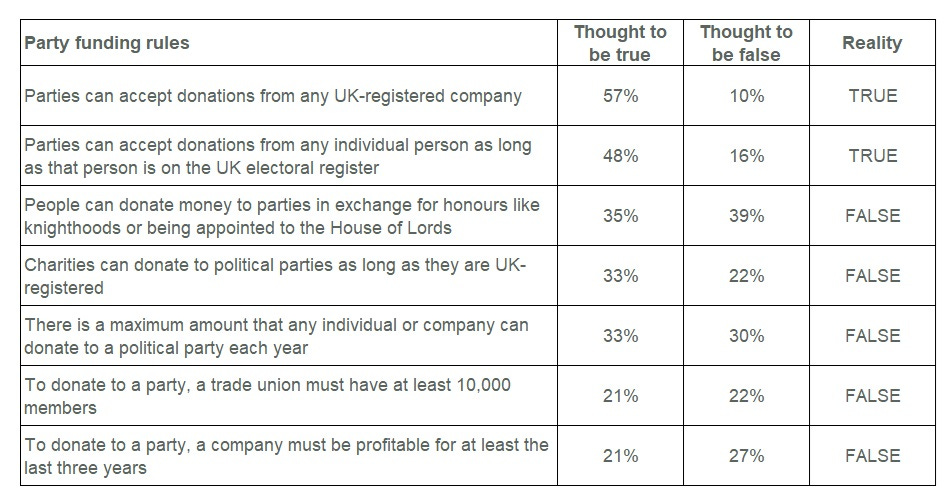The split on the Musk-Farage donation talks

James Crouch ruins the festive cheer by outlining the confusion and division over the UK party donation rules
Published 23rd December 2024
We couldn’t close out 2024 without giving you one final Substack for the year, with a bit of a look into the latest party funding debate that has arisen from the news (rumour?) that Elon Musk is in “open negotiations” with Reform about making a substantial donation, potentially as high as $100 million. (Obviously, no specific amount or commitment has been confirmed yet!)
This has brought to the fore a whole series of questions around party funding in Britain. The issues of foreign interference, transparency, and integrity all come to mind. In Opinium’s last poll of the year, we took a look at what the public currently think the rules are and how that matches up to their preferences. In a festive surprise, a lot about what you think about party funding rules, and especially this Musk-Farage deal, depends on your politics.
What are the current rules?
We started with seven statements about potential party donation rules, mixing true and false rules to see what the public believe is currently in place and what they think is not.

The two rules that genuinely are in place were identified quite accurately by the public. Almost three in five (57%) correctly identified that “parties can accept donations from any UK-registered company.” Similarly, almost half (48%) recognised that “parties can accept donations from any individual person as long as that person is on the UK electoral register.”
However, everything else we tested isn’t actually a rule currently governing party donations, and the public were less clear on these.
For example, a third (33%) think that “charities can donate to political parties as long as they are UK-registered,” while only 22% thought that was false. In truth, charity law dictates that charities must never support political parties; they cannot make political donations or give other financial support or resources.
Division by political perspective
Voters for different parties have quite distinct views about party donation rules. Labour and Reform voters were the most likely to identify various (false) rules as true, while Conservatives, and especially Lib Dem voters, were the least likely.
For example, almost half (47%) of Reform voters think “people can donate money to parties in exchange for honours like knighthoods or being appointed to the House of Lords,” while Conservative voters do not (49% think it is false).
Similarly, 45% of Labour voters think “there is a maximum amount that any individual or company can donate to a political party each year,” but Reform voters are least likely to think that’s true (35% false, 28% true).
A party donation cap?
This brings us to one of the key issues raised by the monetary figures bandied about in the media concerning the Musk-Farage deal: a cap. As we’ve seen, the public overall is unsure whether there even is a donation cap currently in place (33% think there is, 30% think there isn’t).
But the public clearly think a cap is to be preferred. Once we told participants there is currently no maximum amount that an individual can donate, over half (56%) thought there should be a cap on donations, with only 16% disagreeing. This sentiment spans across parties, though to slightly different extents. For example, 76% of Green voters and 69% of Labour voters think there should be a donation cap. Even just under half (49%) of Reform voters agreed there should be a cap, with only 23% disagreeing.
However, the specific case of the potential Musk-Farage deal garners a slightly less clear-cut response from the public: 43% think it would be unacceptable, while 30% think it would be acceptable. We should emphasise that we did not mention the size of the potential donation in question – even if it is from the world’s richest man – but the differing responses by political perspective really highlight how instinctive those reactions are based on your politics : 60% of Green voters, 57% of Lib Dem voters, and 55% of Labour voters think it is unacceptable. Perhaps unsurprisingly, 55% of Reform voters think the deal is acceptable (even though 25% do not).
Perhaps even more interesting is the response from Conservative voters, who are heavily divided on the deal: 39% think it is acceptable, while 37% think it is not. This party donation deal, which firmly unites parties of the left in discomfort and opposition, is yet another issue where Conservative voters are uncertain about the direction to take their party in the face of the challenge posed by Reform.
Subscribe to our Substack read more about the polling we do for campaign groups
See the full table tables here.
Notes to Editor:
Opinium carried out an online survey of 2,050 UK adults aged 18+ from 18th to 20th December 2024 in partnership with The Observer. Results have been weighted to be politically and nationally representative. A majority of the fieldwork took place before the resignation of Louise Haig was announced, or the assisted dying vote took place.


